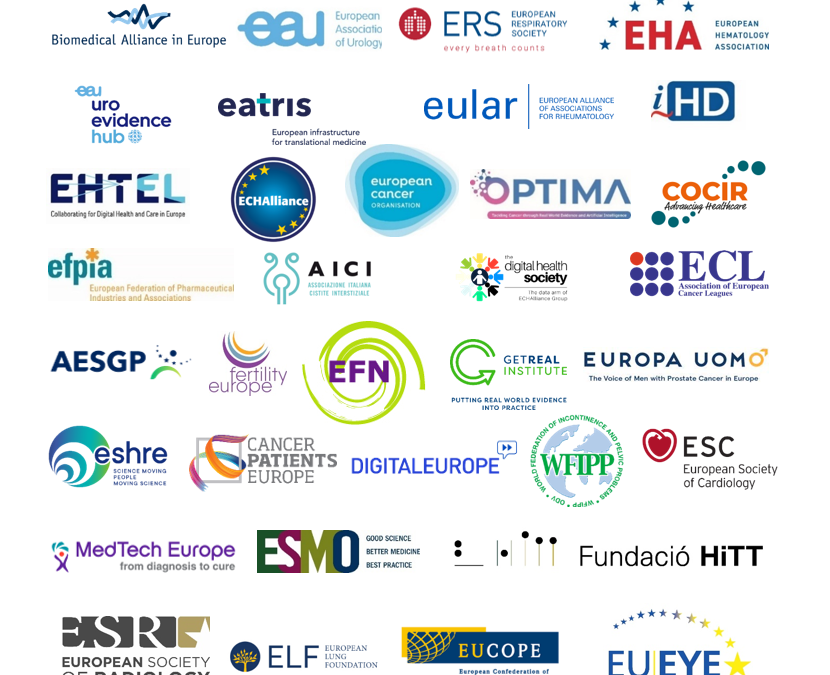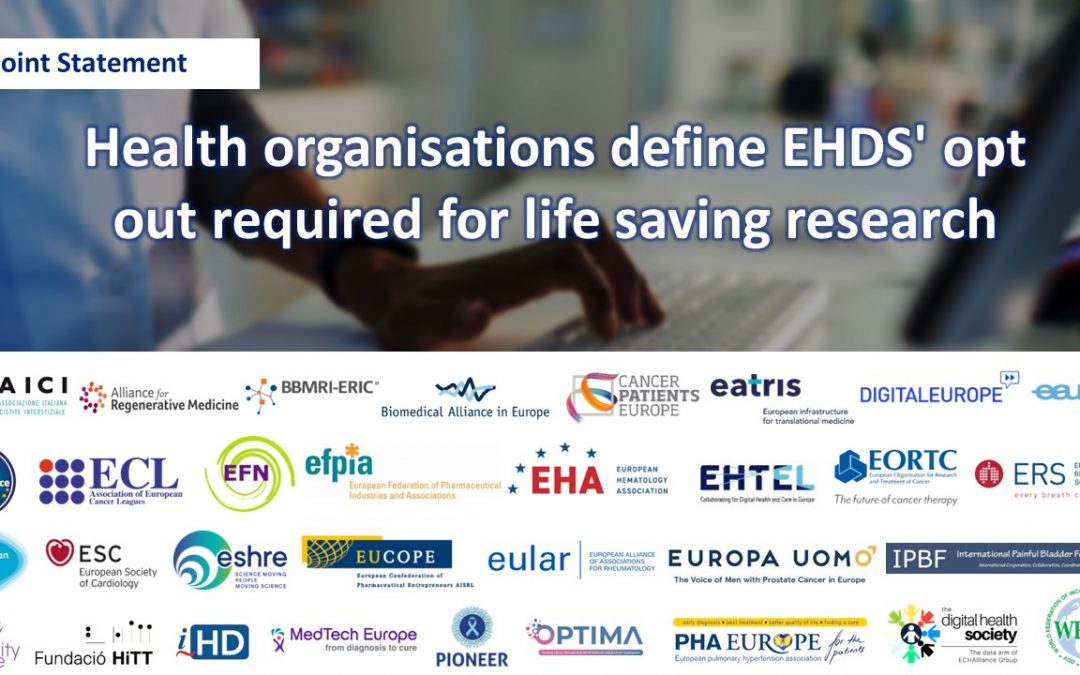
Charting the path forward: Joint stakeholder statement on the implementation of the EHDS (22 April 2024)
The EU health community welcomes the agreement on the European Health Data Space (EHDS) proposal and provides key recommendations to ensure the EHDS will be implemented in a way that provides most added value for patients and European health systems.
The signatories of this statement, which are key stakeholder organisations representing patients, health professionals, researchers, industry and implementer actors in the healthcare ecosystem at both European Union (EU) and Member State level, welcome the provisional political agreement on the Regulation for the European Health Data Space (EHDS) reached on 15 March 2024.
Political negotiators have made substantial progress in the negotiation to agree on the key elements of EHDS. The stakeholder signatories are content to see a text that includes stronger wording on stakeholder involvement, a slightly more harmonised approach to opt-out mechanisms, and increased attention to capacity building in the member states and digital literacy among patients and health professionals. We recognise that the EHDS is an ambitious and innovative policy effort that will be built in a complex environment, and expectations will have to be managed to establish realistic outcomes and timelines. As we move towards the implementation and operation phases, delivering the elements of the EHDS will require EU institutions to involve relevant stakeholders in order to create effective policy tools, instruments, and delegated and implementing acts that will promote harmonised implementation and improve legal clarity. Experience has shown that well-meant policies may fail when they do not reflect the real world that they strive to serve. Therefore, engaging stakeholders in this process is essential to ensure a feasible implementation path forward.
Our patients’, healthcare professionals’, researchers’, industry, and multi-stakeholder implementer organisations, have worked together since February 2023 to develop a set of key recommendations for the implementation phase of the EHDS that could address some of the challenges remaining in the draft document. At least eight elements need to be considered. They include preventing fragmentation in interpretation and implementation of the opt-out and opt-in provisions, appropriate information provision to patients, guidance for data holders, clarity on definitions and interaction with other legal frameworks, better interoperability in practice, enhancing public trust and structural stakeholder involvement. These recommendations are intended to help chart the path forward to a concrete implementation of the EHDS.
Recommendations:
- Address the risk of a fragmented interpretation and implementation of opt-out and opt-in mechanisms
Opt-out mechanisms to the primary and secondary use of data must be implemented in a harmonised manner across Member States to ensure a consistent approach to reduce barriers to cross-border health research.
For the secondary use of data, under article 33.1 Member States may introduce additional safeguards and measures at national level for data categories ‘e, ea, fa, and m’[1]. This provision, which may lead to the introduction of opt-in systems, must be accompanied with clear guidance to ensure harmonised approaches across Member States, to prevent a patchwork of approaches that may lead to the exclusion of certain patient groups or create obstacles for effective cross-border research.
- Provide clear information to patients
To facilitate patients’ understanding of the functioning of EHDS and to help them make informed decisions on the re-use of their health data, the information provided to patients must be sufficiently clear, concise, and shared in a harmonised manner across EU countries. Standardised EU templates should be developed to inform patients, ensure transparency, and establish clear EU guidelines for inferred data usage.
Access to health data by both public sector and private sector researchers is vital to facilitate research and improve patient outcomes. It is critical that patients understand the way their data is protected by relevant frameworks at EU and national level, and how patient confidentiality, prevention of unauthorised access and use of data, and maintaining data integrity are ensured.
- Limit the additional burden on healthcare professionals
The implementation of the EHDS must not add to the already high workload of healthcare professionals. There is a need for sufficient support, guidance, and tools to help healthcare professionals fulfil their additional roles and responsibilities under the EHDS and develop the required digital skills and competences, as well as investment in infrastructure and data as well as digital health literacy in general. Adequate resources and funding should be provided at the EU level to support training initiatives, streamline compliance procedures, and allocate resources efficiently. It is crucial to ensure that resources are properly and uniformly allocated at the national level to avoid discrepancies in implementation speed and capacity among Member States.
- Interoperability of EHRs in Practice
The interoperability of EHR systems is key for the functioning of the EHDS and needs to be strengthened because of the current diverse landscape of healthcare data sources. To address this issue, it is imperative to clarify and streamline the definitions and rules governing EHR systems within the EHDS framework and to use of fit-for-purpose standards for interoperability that are in line with existing best practices. It is also essential to co-create implementation or migration pathways with relevant stakeholder organisations.
- Enhance legal clarity & improve definitions
There is a need for additional guidance and legal clarity on the different definitions and the interplay with other legislations, to prevent a fragmented interpretation and implementation. The interplay between EHDS and other existing legal frameworks, such as the General Data Protection Regulation (GDPR), the Medical Devices Regulation (MDR), the In Vitro Diagnostic Medical Device Regulation (IVDR), Artificial Intelligence Act and the Clinical Trials Regulation (CTR), presents challenges in ensuring coherence and compatibility across different regulatory regimes. This requires a careful assessment of the application of the different regulations, and guidance on their interaction. At the same time, implementation guidance related to the definitions and obligations of data holders and users can help the health community to better fulfil their foreseen roles in EHDS.
- Ensure systematic stakeholder involvement throughout the implementation and operation phases
We welcome the inclusion of new provisions on stakeholder involvement, including the creation of a new Stakeholder Forum. However, the involvement of patients, healthcare professionals, researchers, and industry representatives and implementer fora must be further defined to ensure this involvement in the implementation and governance of EHDS happens in a systematic manner. Establishing mechanisms for ongoing consultation, capacity-building initiatives, and transparent decision-making processes will enhance EHDS governance, foster trust and optimise stakeholder contributions. By empowering stakeholders and leveraging their expertise, policymakers can develop informed, responsive, and inclusive EHDS policies and initiatives, ensuring their success and sustainability.
In conclusion, we believe that the political agreement EHDS represents a significant step forward towards putting the patient at the heart of healthcare and improving proper data access and sharing. We look forward to continuing the dialogue and contributing to an effective implementation and governance of the EHDS to improve healthcare and research, while promoting effective and efficient patient-centric care through interoperability and innovation across the European Union.
[1] Human genetic, epigenomic, genomic data, other human molecular data, data from wellness applications, data from biobanks and associated databases





